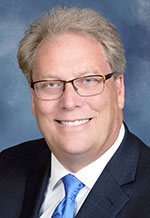Our Works of Charity / David Bethuram
Doing more to make life easier for our aging population

It is well known that as a society we are living much longer thanks to improved living conditions and health care.
In January 2020, Pope Francis near the end of a three-day conference on the pastoral care of older people sponsored by the Vatican Dicastery for Laity, the Family and Life, stated that the Catholic Church at every level must respond to the longer life expectancies and changing demographics evident around the world.
Retirement can be seen as marking the time when productivity and strength decline, or it is a time when older persons are still physically fit and mentally sharp and have more freedom than when they were working and raising a family.
In both situations, the pope said the Church must be there to offer a helping hand if needed, benefit from the gifts of the older person and work to counter societal attitudes that see the old as useless burdens on a community.
While being able to reach old age is something to be thankful for, in many ways there are several challenges facing the older person, which need more attention. Often, it is not until we start to age ourselves or we see a loved one struggling that we sit up and take notice. But, as a society, we can do more to make life easier for our aging population. This column outlines the biggest challenges that older people face today, and how we can support them and enable them to age with dignity.
Ageism and a lost sense of purpose
There are lots of outdated stereotypes about older people, which can lead to isolation and marginalization. By finding also innovative ways to involve older people in the community through social events, we can not only help them to maintain a sense of identity and self-esteem, but also tap into the wealth of knowledge and experience they have, which is so vital for the development of society.
Financial insecurity
While we are living longer, the world of employment and retirement unfortunately has not evolved at the same pace. Many older people are able and more than willing to work past the standard retirement age, but the opportunities are not there. In addition, managing day-to-day finances and planning for later life can be challenging for older generations as much is now done online or remotely. This can also leave them more vulnerable to fraud and scams.
Difficulty with everyday tasks and mobility
A person’s mobility and dexterity will naturally decline as they age, which makes completing everyday tasks more difficult. This can also limit them from being social or taking part in activities they enjoy. More support is needed to enable older people not only to live independently through products and programs which focus on safety, balance, fitness and mobility, but also to ensure they can continue to thrive as an individual.
Finding the right care provision
When complete independence is no longer practical, many older people require additional care. Sometimes this care can be provided by family members, but this can place a lot of strain on the caregiver in terms of balancing this with work and other family responsibilities. These caregivers need to be given the training, resources and the emotional support needed to help them give the best care for their loved ones and themselves.
In some cases, it is more appropriate for a professional caregiver to be employed on a regular basis, e.g., when there are complex medical conditions and/or physical disabilities. With options like adult day services or other comprehensive elder care services, the person is able to remain in their own home.
Access to health care services
Health care can be complicated and disjointed for older people, especially for those struggling with long-term conditions. The care requires lots of different medical professionals and clinics to coordinate delivery of medication and other types of care.
End-of-life preparations
We all need to prepare for the inevitable, but death is often a difficult topic for people to discuss or make plans for. Older individuals and their families need support when considering end-of-life options, financial implications,
and how to ensure that the individual’s wishes are respected.
(David Bethuram is executive director of the archdiocesan Secretariat for Catholic Charities. E-mail him at dbethuram@archindy.org.) †
